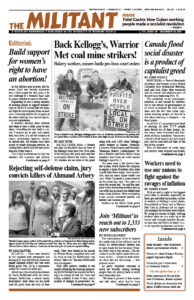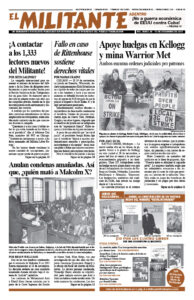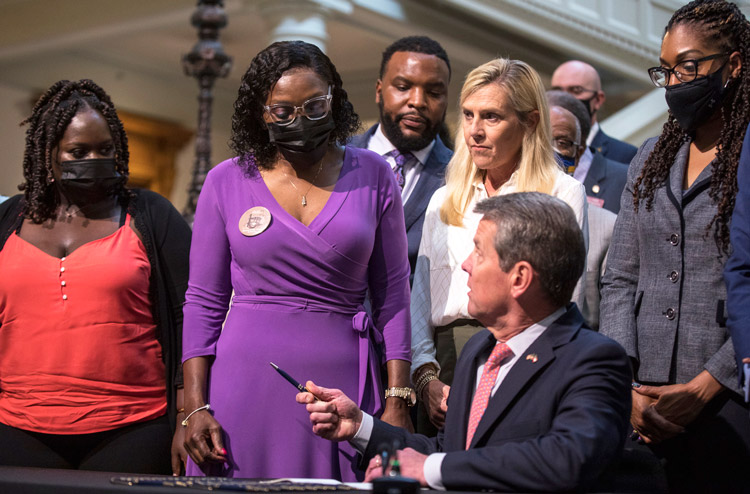ATLANTA — Three men involved in the vigilante-style entrapment and killing of 25-year-old African American jogger Ahmaud Arbery last year were found guilty Nov. 24 in a unanimous verdict by a nearly all-white jury.
Arbery was chased and gunned down by Travis McMichael while his father, Gregory McMichael, a retired county investigator, drew down on the youth with his pistol from the back of their truck. They were joined in the assault by William Bryan, a neighbor who used his truck to help the McMichaels trap Arbery “like a rat,” the elder McMichael told investigators.
Only after protests swelled in the months following the shooting demanding the McMichaels be arrested did facts begin to emerge of how the chase and killing unfolded. It took 74 days, and a number of changes in prosecutors, before charges were brought. It was a leak of a video of the killing taken by Bryan that broke the case open.
After contentious jury selection that resulted in a jury of 11 Caucasians and one Black, the trial began Nov. 5.
In her opening statement, Cobb County prosecutor Linda Dunikoski told the jury the three defendants acted with deadly intent as they hunted Arbery down, trapped him, and, when he tried to defend himself, shot and killed him. She explained how the elder McMichael told police he shouted at Arbery, “Stop or I’ll blow your f—ing head off!”
“This isn’t the Wild West,” she told jurors, saying the accused jumped to assumptions about a “Black man running down the street.”
The defendants and their attorneys staked their defense on a Civil War-era law that allows civilians to conduct a “citizen’s arrest” if they saw someone commit a felony, or if they had probable cause to believe someone committed a crime.
Travis McMichael, who fired three blasts from his shotgun and killed Arbery, which was graphically shown on the leaked video, was the only defendant to take the stand. He said he and his father chased Arbery believing he was involved in neighborhood burglaries.
Arbery and others had been seen on security camera footage entering a home under construction there. On different occasions Arbery, who jogged through the neighborhood, is never seen taking anything.
Asked why he and his father grabbed their guns and chased Arbery, Travis McMichael said he believed the youth might be armed.
When the three defendants chased Arbery, he turned and tried to disarm the closest one, who was Travis McMichael. He told the jury it was self-defense, claiming, “It was a life or death situation.”
Then, in a crucial point in the trial, under cross-examination, McMichael admitted that Arbery never threatened him, pulled out a weapon or even talked to him. And he never told Arbery he was trying to arrest him.
Cops, prosecutors aid cover-up
Cops arriving on the scene after the shooting of Arbery treated the McMichaels as one of their own, taking their word for what happened. Their body camera footage shows them involved in casual banter with the McMichaels. No attempt is made to render aid to Arbery.
“If I could have got a shot at the guy, I’d have shot him myself,” Gregory McMichael told the cops.
Local prosecutors refused to press charges. State authorities stepped in after the video became public and opened the case that led to the trial.
Defense attorneys repeatedly shot their clients in the foot by raising racial issues throughout the trial. When the trial opened, they urged Superior Court Judge Timothy Walmsley to bar gatherings on courthouse grounds by Arbery supporters. Bryan’s defense attorney complained about Black pastors sitting with the Arbery family in court and asked the judge to bar their attendance. “We don’t want any more Black pastors coming in here,” he said.
In response, hundreds of Black pastors and others gathered on courthouse grounds. Defense attorneys then moved for a mistrial, denied by the judge.
Throughout the trial defense attorneys attempted to paint Arbery as a criminal.
The judge denied defense motions to allow Arbery’s past encounters with the law and a dubious opinion of his mental health to be presented to the jury, pointing out the defendants had no knowledge of this when they decided to pursue Arbery.
In a final effort to turn the victim into the criminal, defense attorney Laura Hogue said, “Turning Ahmaud Arbery into a victim after the choices that he made does not reflect the reality of what brought Ahmaud Arbery to Satilla Shores in his khaki shorts with no socks to cover his long, dirty toenails.”
The prosecutor largely tried to downplay race in the trial. One New York Times article said Dunikoski presented her case to the jury like a “strict high school teacher,” marshaling facts about the three defendants and their conduct toward Arbery.
The judge denied an attempt by the prosecution to place in evidence a statement by Bryan to police that Travis McMichael had called Arbery a f—ing n–ger” after shooting him. The judge ruled the allegation was too inflammatory and prejudicial. Use of a statement by one of the defendants to incriminate another could also violate constitutional protections against self-incrimination.
It didn’t take long for the jury to return a verdict. Travis McMichael, who fired the shots killing Arbery, was convicted on all nine counts, including malice murder, meaning he deliberately intended to kill Arbery. All three were convicted of aggravated assault, false imprisonment and attempt to falsely imprison. Gregory McMichael and William Bryan were not found guilty of malice murder, but of felony murder, which is when a group of people commit a felony where someone is killed, even if they weren’t responsible.
In the name of fighting crime, many capitalist politicians and prosecutors have used “felony murder” charges in many states across the country to obtain harsh and long sentences.
In this case, these two convictions can carry the same life sentence as Travis McMichael’s conviction for malice murder. Judge Walmsley has yet to set a sentencing hearing. Attorneys for all three defendants say they will appeal.
The three defendants also face a federal trial on hate crimes charges. Once used as a way to get around the refusal of segregationist government officials in the South to prosecute racist violence against Blacks and denial of civil rights, such laws today are increasingly used to erode defendants’ constitutional protection against double jeopardy.


